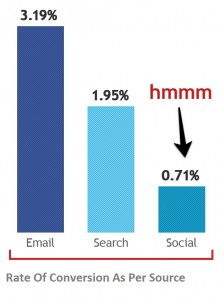
A report on traffic analysis and ecommerce conversion efficacy of a number of reputed and leading ecommerce retail sites is produced every quarter by Monetate, an ecommerce firm which specializes in optimization. A recent report presented by them was of first quarter which took into consideration more than 550 million ecommerce site’s browsing sessions. The results of the report were astonishing.
Experts view on social traffic for ecommerce sites
Few ecommerce experts were asked to comment and assess these reports. These experts mentioned the following in their report.
The traffic coming from social media as direct traffic to online stores was not considered worthy enough to convert. They mentioned that out of the total traffic received by these sites only about 1.5 percent was from social platforms with a conversion rate of less than 1 percent. Thus from the latest analysis, visitors arriving directly via social platforms to ecommerce sites did not turn out to be profitable as they used to be.
Participating in social media has become all the rage now a days and a lot of importance has been given to it which may not seem to be that effective as far as ecommerce websites are concerned. An effective way to find out which traffic is converting is to find out from which platforms these visitors come from just before landing on the given site.
Here is an approximate analysis of conversion rates from different sources of traffic.
Has Social media lost its effectiveness ?
Social media can be considered as additional factors which can boost the conversion rates but may not necessarily result in a conversion (purchase). A recent research study shows that about 75 to 80 percent of sales are a result of word of mouth (WOM) publicity. By using brand or product names, or by using website links word of mouth is happening through social media platforms. But since social media was not the final step before purchase it does not get any credit for behavior of the visitor coming from it.
One example where social media plays role in awareness is mentioned below .
This scenario is where a corporate executive asked his friends on Facebook to tell him a reliable and reputed source for glass lenses. Within a short span of time, a lot of suggestions were given for brands which was famous in his local area. Immediately after receiving the suggestions, the executive opened his browser and visited the link which was mentioned by his friends and he did purchase the lenses online. Now, the entire credit for this purchase to complete goes to word of mouth from trusted individuals that is a direct channel although the communication occurred via social platform. A very similar scenario would be when you visit a sports club where your own relative is a member and from which somebody recommended this to you. And then from here they recommended a sports store from which you buy sports accessories for you and your family. Subsequently you go home and search on Google and visit the sports accessory website and complete an order. The question is, did the purchase happen because of search engine or because of word of mouth?
New research from Google has stated that social platforms are indeed very useful for creating awareness and branding but is not that useful for conversions per se’. The online consumer behavior studied by Google, suggests social media is not the direct route to purchase. Also ecommerce companies which develop ecommerce websites and promote them also have the same data and beliefs as a result.
Sequencing problem.
We all know that facebook and pinterest users stay locked and hooked into their accounts once they have logged on. But more often than not when an advertising link to purchase a product – from ecommerce site – is displayed in front of them, they choose to ignore this because as they are engrossed by the social network, they are not qualified customers. They may make a mental note and choose to visit the site later and thus the chance of visiting the website from a direct source increases as opposed to from a social platform.
A better feature in Google Analytics would assist with conversion data and to get a better understanding of this conversion funnel, so that it would be clearer to as which offline and online channels for marketing should be used which would produce the desired results. How is the real question!


